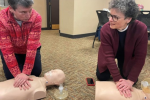July 27, 2012
Anxious Decisions or Passionate Urgency?
Spiritual Health of Congregations: Anxious Decisions or Passionate Urgency: Part 1
In the next five blog posts I will introduce congregations to the principles of the spiritual life, discernment, and making Spirit centered decisions. There are many kinds of spiritual practices. Ignatian spiritual practice is unique due to its principles of discernment that are central to an Ignatian spirituality. In this first post I introduce the necessity and value of spiritual discernment. In the next three posts I will introduce the three spiritual states: spiritual consolation, spiritual desolation, and tranquility. In the final post I will introduce spiritual freedom and the manner in which congregations need to shed "inordinate attachments" to be spiritually available to make urgent decisions.
"Urgency" is the lens I will use to help congregations make the necessary judgments of when urgency is a symptom of anxiety and when urgency is a grace, a gift of spiritual maturity and the result of being in a deep and intimate relationship with Christ. These five posts offer the reader the characteristics of spiritual desolation, spiritual consolation, and spiritual tranquility coupled with reflection questions to help congregational leaders determine the spiritual state their congregation is at this time.
Post #1: "The Value of Spiritual Discernment"
Spiritual discernment is a collection of practices that lead people and congregations through a group decision-making process grounded in the wisdom and blessing of the Holy Spirit. The group nature of this decision-making process does not necessarily lead to consensus but rather to dominant patterns of the way the Spirit manifests God's self to each community and congregation. Spiritual discernment takes intentionality sometimes manifested in length of time and sometimes in depth of listening. Discernment flows out of prayer and reflection on the scriptures and the way these texts intersect with our life experiences. Through discernment we learn to sharpen our listening skills. We learn how to know if we are moving closer to God or away from God in the choices that we make. We learn to differentiate our desires and voice from the desires of God and the Spirit's still voice.
Congregations sometimes face urgent decisions, particularly those congregations that need to foster vitality, viability, mutuality and mission. Urgency is often conflated with anxiety by congregational leaders who have been trained in systems theory, but have not received as much training in spiritual discernment practices. Anxious congregations are encouraged through non-anxious congregational leadership. For further reading see Rabbi Edwin Friedman's Generation to Generation (The Guilford Press, 1985) and Peter Steinke'sCongregational Leadership In Anxious Times: Being Calm and Courageous No Matter What(The Alban Institute, 2006).
One of my favorite images of Ignatius of Loyola is a statue of him at Guelph Retreat House in Guelph, Ontario. The statue's inscription is "Ignatius in Haste"! The life size image of Ignatius has him in motion, leaning forward, with his black cassock raised by the blowing wind due to his decisive mission stance and urgent action. In his stance, I am confident that Ignatius is both non-anxious and spiritually free in his passionate urgency and response towards God's mission. Yet for too many, passionate urgency and non-anxious leadership are at odds and thought of separately.
Non-anxious leadership and spiritual discernment principles are important companion tools for any congregation, but especially for viability threatened congregations that need to make urgent decisions. It is good to be a non-anxious congregation and some non-anxious congregations are also viability threatened congregations. Anxiety is a psychological state with spiritual ramifications. Non-anxious interventions are not sufficient for congregations that face urgent decisions. All congregations would benefit from spiritual discernment.
In The Spiritual Exercises of Ignatius of Loyola, retreatants are encouraged not to make discernment choices during spiritual desolation (dark night) or even during spiritual consolation (joy), but rather only during times of sustained tranquility. In tranquility our hearts, minds and souls are open and spiritually free from distractions and inordinate attachments (these terms will be fully discussed in blog #5 of 5) to hear the still voice of the Holy Spirit. Making urgent decisions out of desolation or consolation typically leads to unsustainable decisions. Urgent decisions are not founded on the wisdom and grace of the Holy Spirit but rather emerge out of our need to constantly take action. The need to constantly act resonates with an anxious congregation. A less anxious congregation might still not be spiritually free to make Spirit led decisions.
Through the practice of spiritual discernment and listening, people and congregations learn to observe and interpret the movements of the Spirit. The three movements or states of the Spirit are desolation, consolation, and tranquility. In the next three posts I will introduce the congregational characteristics of these three movements and states. In each post I offer some reflection questions that will preliminarily introduce congregations to learning to observe and listen deeply.
Here are a few preliminary reflection questions to assist you in the assessment, if your congregation values spiritual discernment practices in its decision-making:
- What is the congregation's decision-making process?
- What role does communal prayer and discernment play in your congregational discernment?
- How does your congregation listen to the Spirit?
- Has the congregation ever been led by the Spirit to do something that it had not already wanted to do?





